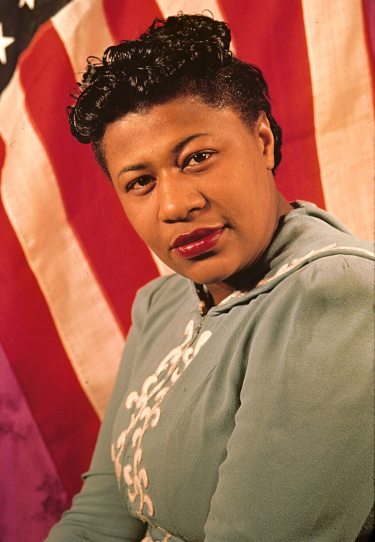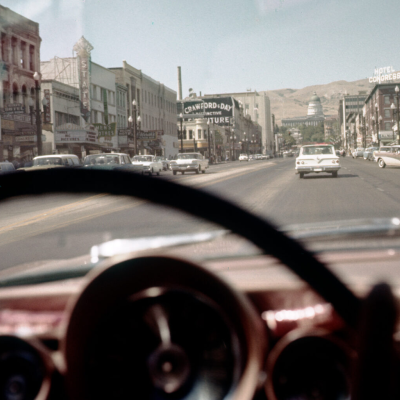.
.
“Space for Nothing” a story by Pamela Nocerino, was a short-listed entry in our recently concluded 57th Short Fiction Contest. It is published with the permission of the author.
.
.
___
.
.
Public Domain/Wikimedia Commons

.
Space For Nothing
by Pamela Nocerino
.
…..When Romel received his Tony Award, we all watched the glowing television screen together, more out of curiosity about his appearance than with pride in our past connection to him.
…..Romel’s hair used to be like palm leaves. The ends, leaning from weight, reached up, out, and then down against his wiry shoulders, and the gray stripes in his black hair added a freakish drama to his signature reclusive style.
…..When we first met him 20 years ago, his charcoal curls grabbed the attention of even the most self-absorbed actresses in our repertory theater. However, Romel prized his personal space and kept even the most beautiful admirers at arm’s length.
….. Last year, while gathering his few personal belongings from the top of the catwalk where he lived, he began to leave without an explanation or goodbye.
…..“Romel, are you quitting on me?” our director called up to him.
…..“I don’t know,” he answered without stalling his work, “but I am going to New York for five weeks.”
…..Romel could fit everything he owned into a 12 x 12 space, we were sure of it. Every corner and curve of his belongings nestled together like a puzzle. When he arranged and rearranged our set pieces, he muttered to himself constantly about air, “If it’s there, it should be there for a reason. Without a reason, move it out.”
…..He seemed to perceive everything that way – space, furniture, music, people.
…..When he first entered our theater for his interview, our director asked him, “Tell me why I should hire you.”
…..“Because I know when something works and when it doesn’t.”
…..After answering that one question, Romel moved toward the stage. He walked around the seats and over the discarded props like he knew the place too well, and then stood for a moment with his hands moving in gestures that seemed to will the air out of the way. Or he was conducting. Suddenly, frantically, he rearranged the set pieces – alone – in spite of the fact that we were in final dress rehearsals, and he hadn’t been hired yet. The director watched and liked the result – the lines, the shapes, and the spaces between were perfect.
…..After that day, he never left us until he went to New York. Again his movement was silent and frenetic, and still we knew nothing about him.
…..“I’ll be designing sets for a new play about the aftermath of 9-11,” Romel explained quietly, not so much to announce why he was going, but rather to jump-start the brainstorming he immediately began in his mind.
…..It was strange. He was packing for a dream job and still we pitied him. The worn creases of his sleeves looked weary as he forced them again and again to succumb to his histrionic gestures. Where his voice was quiet, his movements were loud, as though they had to balance his expressions one at a time.
…..That was 13 months ago, and we didn’t hear from him again until last week by email. It read, “Thanks for the job. You can use my room on the catwalk for something else now. It appears that I am staying here.”
…..For the awards show, we gathered around a laptop screen in the theater together. Throughout the commercials, we talked about a time when he seemed to float around the theater. We were doing a play about a honeymoon couple, and Romel was especially meticulous about every detail. The sunset was to be mimicked just so and he tormented the lighting director until it was perfect. The bed had to be a certain height, the empty wine bottle a certain year. The jazz by Miles alone. We realized then that he had truly loved someone.
…..He refused to answer questions about the person except to say that he could love but once. There wasn’t room for more than that inside of him. We listened to him then exactly like we watched him pack several years later, with curious indifference.
…..But we watched the Tony’s with complete attention. When the Broadway performers announced the people nominated for set design, the camera predictably blinked at each nominee. Except Romel.
….. “He didn’t go!” we shouted, “He’s not there?”
….. “. . . and the winner is . . .”
…..He won! They called Romel! Awkwardly, the hosts looked around, then at the teleprompter for help, until finally their eyes looked up above the cameras.
…..A single camera moved suddenly to catch a glimpse of a man waving his arms and descending from the catwalk. By the time Romel reached the podium, the crowd was roaring and clapping with surprise.
…..He explained nothing as he pushed his striped ponytail behind his shoulders. The house quieted and we laughed.
…..“Rarely, we are given an opportunity to see from a view like that, where what we see is close to what really exists. The whole view. That’s my job, to create that balance of order and disorder, out of memory and dream, to…”
…..He didn’t finish the sentence. His hands took over when his words paused, and the musical conductor thought that he was cueing them to begin.
Romel walked off the stage, still finishing his sentence in his head, cocooned in symphony, and wild with gesture.
.
.
___
.
.

Pamela Nocerino grew up in a house full of music – The American Songbook, jazz, and folk. Her sister is a jazz singer who helps her stay up late for the live music scene. Pamela is a writer and teacher who once helped build a giant troll in the Rocky Mountains. Two of her short plays were selected for staged readings in Colorado and Georgia, and some of her poems were selected for Plum Tree Tavern, Splintered Disorder Press, Gyroscope Review, Third Estate Art’s Quaranzine and Capsule Stories.
.
.
___
.
.
Listen to the 1954 recording of Miles Davis playing “Blue Haze,” with John Lewis (piano), Percy Heath (bass) and Max Roach (drums)
.
.
___
.
.
Click here for details on how to enter your story in the Jerry Jazz Musician Short Fiction Contest
.
Click here to read “Constant at the 3 Deuces” by Jon Zelazny, the winner of the 57th Jerry Jazz Musician Short Fiction Contest
.
.
.






































